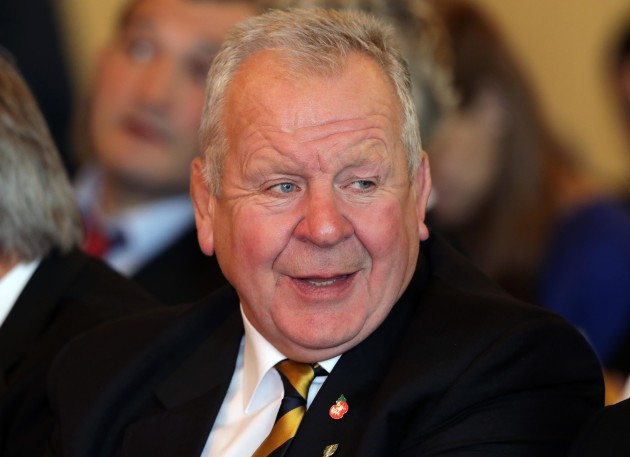LIKE MANY OF us, those at the highest levels of rugby administration have been getting very accustomed to videoconference calls over the past two weeks.
With the heads of the major unions joining the World Rugby-hosted meetings, their mission is to secure the short-term future of professional rugby.
There are far more important things going on in the world, of course, but rugby has a defining challenge on its hands.
It’s clear that the sport is facing the same kind of deeply worrying financial times that so many other industries are. No rugby games essentially means no revenue.
We’ve seen the reaction around the world with swift pay cuts and pay deferrals, the latter of those here in Ireland as the IRFU announced 10 to 50% deferrals for all employees. The Irish union’s hope is to repay those deferrals if and when things get back to normal.
The priority for World Rugby at present is for each of the unions to thoroughly assess their own financial state, with the governing body set to help those who are most worryingly in the red to come through this testing period.
World Rugby has reserves of cash, with last year’s World Cup having helped in that regard, but is keen not to wildly throw that money around and risk the entire future of the pro game if there is a second wave of Covid-19 or any other unforeseen crisis.
USA Rugby has already filed for chapter 11 bankruptcy, although that prospect was likely before the coronavirus outbreak. With World Rugby centrally involved, the hope is that the American union will emerge from a 60-day process in a more stable and restructured state. Their national teams will survive.
Having cancelled its 2020 season, Major League Rugby – which is not USA Rugby-owned – should also continue next year.
The next biggest concern is Rugby Australia, with the Aussie union certainly far from wealthy. The game in that part of the world has been on precarious ground for some time but Australia remain one of the leading rugby nations and it seems likely that World Rugby will have to provide support.
75% of Rugby Australia’s non-playing staff have been stood down, with the remainder taking pay cuts. The players are next in that regard as the Aussie union faces the stark reality of revenue losses of €67.2 million in the worst-case scenario this year. One of the four Super Rugby franchises could even be cut due to the financial damage.
Other unions are in better financial condition, with the IRFU and Scottish Rugby among them. Their moves to pay deferrals rather than cuts indicate as much, although they too will be in very real danger if the current situation continues into the summer and beyond.
Once the immediate financial side of things is clearer, World Rugby and the unions will attempt to agree on how the rugby calendar might look for the remainder of this year.
Encouragingly, there has been a third party involved in these discussions in the form of English and French clubs, who are not union-run. Too often in the past, they have been on the outside of these top-level discussions and acting at odds with Test rugby.
The fourth party privy to the debate and discussion has been International Rugby Players, whose focus is on safeguarding players’ welfare amidst the possibility of a congested calendar in the near future.
The reality is that the July Tests – including Ireland’s two-game tour to Australia – will not take place as currently scheduled, barring a miracle turnaround. That would, of course, be a big financial blow to the Southern Hemisphere unions, which World Rugby may need to offset.
Australia, New Zealand, South Africa, and Argentina are naturally be keen to ensure the 2020 Rugby Championship is completed to give them vital revenue from home games. Currently scheduled for August and September, it will be the priority.
Meanwhile, the home nations on this side of the world are desperate for the postponed 2020 Six Nations fixtures to be played this year for the same financial reasons.
There appears to be some fear that the November Tests hosted in Europe could be squeezed but that’s very unlikely given how lucrative they are. But depending on the duration of the current crisis, there will have to be compromise somewhere.
Right now, it remains guesswork as to what exactly will happen but World Rugby are doing their best to offer a number of possible solutions regarding the calendar, with the primacy of Test rugby, and its financial value, being respected.
It is hoped that a more concrete picture will have emerged by the end of April, when there may be more certainty around the coronavirus.
The hope within the IRFU is still that Irish players can return to training on 18 May for a pre-season that will allow them to complete the 2019/20 Pro14 and Champions Cup campaigns in July and August.
A very short break would follow before the 2020/21 season starts in September, with Ireland’s two postponed Six Nations games squeezed in before the three scheduled November Tests against the Wallabies, South Africa and Japan in Dublin.
Every other union and league has its own ideal scenario but the uncertainty around the pandemic – how long it will last, when players can get back training, whether international travel will be allowed – means the game needs a raft of options for what comes next.
On a governance scale, the likelihood is that there will be changes to World Rugby’s Regulation 9, which protects the availability of players for international rugby, to help ensure that the re-jigged schedule functions within the game’s own laws.
The one positive in the mess is that unions and the clubs are working together with World Rugby, something that is all too rare.
The governing body’s Nations Championship proposal was rejected last year but the current collaboration may work out very positively in the long run if it leads to greater alignment in the global calendar.
Rugby fans have been screaming out for a genuine global season for years.
While rugby cannot suddenly rip up the previous script and drastically redesign the whole calendar, the sense within the game right now is that these discussions will result in more alignment between the Northern Hemisphere and Southern Hemisphere seasons.
One has to hope that any such moves also ensure greater shares of the financial pie for the Pacific Island nations and others who have long been vastly under-resourced.
Uncertainty abounds but rugby may have a chance to change for the better.



